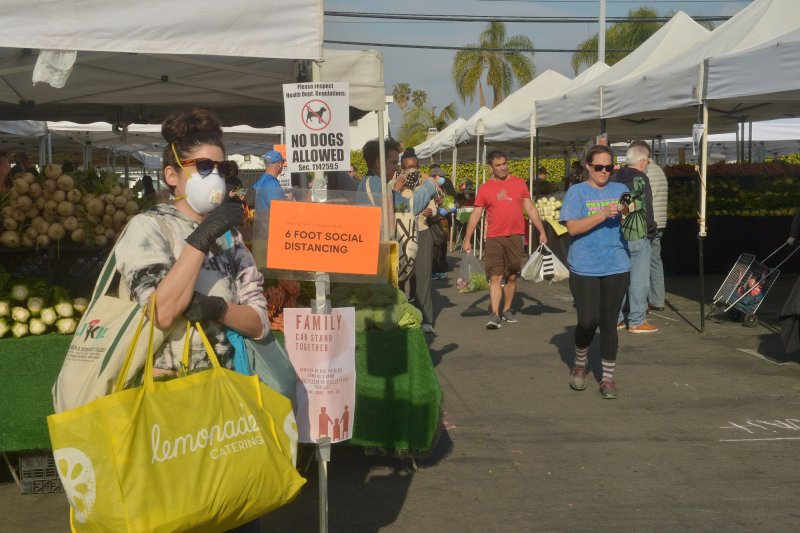Three international-level leaders said a lack of awareness could severely harm the world's poorest nations
By Clyde Hughes

Shoppers browse food and other items at a farmer's market in Los Angeles, Calif., on Sunday. International leaders say nations of the world reacting to the coronavirus outbreak must ensure that their emergency actions don't inadvertently disrupt the food supply chain. Photo by Jim Ruymen/UPI | License Photo
April 1 (UPI) -- Leaders of three global organizations have warned that governments worldwide could invite a food crisis if they don't anticipate potential consequences of their extraordinary and emergency actions to fight the coronavirus.
The heads of the World Health Organization, World Trade Organization and Food and Agriculture Organization said it's critical to remind world leaders they need to be aware of such ramifications that could follow their response to the pandemic.
The leaders of the three organizations -- Qu Dongyu of the FAO, Tedros Adhanom Ghebreyesus of the WHO and Roberto Azevêdo of the WTO -- particularly emphasized the impact that significant changes to trade policy could bring.
"When acting to protect the health and well-being of their citizens, countries should ensure that any trade-related measures do not disrupt the food supply chain," they said in a statement Tuesday. "Such disruptions including hampering the movement of agricultural and food industry workers and extending border delays for food containers, resulting in the spoilage of perishables and increasing food waste."
RELATED Egg suppliers scramble to restock stores after panic buying reduced supplies
Scenes from a pandemic: World copes with COVID-19

A man walks in an empty arrivals hall in the Ben Gurion Airport in Lod, Israel, on April 1. Photo by Debbie Hill/UPI | License Photo
Dongyu, Ghebreyesus and Azevêdo said harmful trade restrictions could arise from unjustified concerns about food safety. Such measures, they cautioned, could be especially devastating for the world's poorest and least developed nations.
"It is at times like this that more, not less, international cooperation becomes vital," they said. "Every effort must be made to ensure that trade flows as freely as possible, especially to avoid food shortage.
"Similarly, it is also critical that food producers and food workers at processing and retail level are protected to minimize the spread of the disease within this sector and maintain food supply chains."
Policy changes in trade, food production, consumption and stocks all have the potential to impact the food supply chain, they said.
The FAO has already called for strengthening food production and distribution systems to fight global hunger and infectious diseases, like COVID-19.
No comments:
Post a Comment